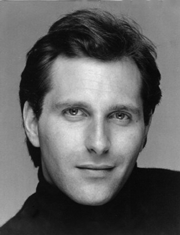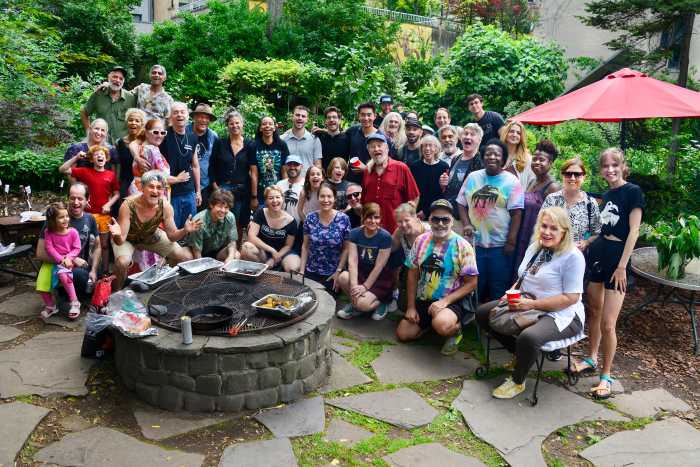By Noah Fowle
Theater is in Michael Horn’s blood. Nicknamed “Box Office” at birth, the self-proclaimed producer, house manager, publicist and janitor of the Big Little Theater, home of the Michael Chekhov Theater Company (www.chekhovtheatre.com) on 141 Ridge Street, Horn was raised in the East Village by a family of actors, directors, and playwrights, and has been around the stage as long as he can remember. His aim is to “to produce some of the best theater in the world,” and he’s begun that task by mounting The Sam Shepard Festival. Already 11 productions underway, Horn plans on putting on all 45 of the celebrated writer’s plays, both full lengths and one acts by the end of 2007.
On the particular afternoon we spoke, Horn, 48, looked as if he had stepped out of one of Shepard’s misanthropic scenes, dressed in a worn pair of snakeskin boots, straight black jeans, and a faded button up shirt. He hesitates to comment too much on Shepard and his work, admitting that he is not a scholar. But he holds little back when discussing the state of small theaters in New York, including his own Lower East Side performance space, which officially opened its doors in March of this year. When asked about his expectations for Off-Off Broadway, Horn considers it carefully, and what follows sounds remarkably similar to the lamentations of one of Shepard’s characters in the waning moments of a play, after all of the alcohol is drunk and a heavy sigh hangs in the air.
What makes for a good Sam Shepard production?
Well it helps to have actors that are suited for it, and ours are. You need intense, physical and sexual actors. These are also the qualities of his plays. I guess it also helps to know a little bit about drinking and to have a good pair of cowboy boots at home.
Why should an audience see a performance in your small theater space verses a larger production uptown?
I believe his work is more suitable for small theaters. It puts you right on top of the action. It’s like being courtside at a basketball game. It’s hotter, more intense. The passion from the actors is more fervent and you can feel their sweat. The audience is allowed to have more of a communion with the performers. Shepard’s plays cry out for all of that.
When was the first time you came across Shepard’s work? What stuck with you?
I was 21 and a girlfriend of mine really wanted to do “Cowboy Men.” It was 1977 and everyone was infatuated with Sam Shepard. He was unique then and still is today. Nobody writes like him. I always felt a lot like those characters in his plays, and I think that I was influenced by a lot of the things that seemed to influence him –rock and roll, the Midwest, landscapes.
A playwright is bound to have stronger and weaker material. Why were you so eager to produce Shepard’s entire body of work?
Because it had never been done before. I think it’s of tremendous value to have an undertaking that no one else in the world has ever attempted. We are making a big statement both for the playwright and the audience.Also, many young people today don’t know who Shepard is and he’s written for four or five decades. He’s arguably the greatest American playwright alive today.
For you, what is at the heart of Sam Shepard’s writing?
He covers so much. There really isn’t anything he doesn’t get into. He writes a lot about relationships struggling under the strain of corruption, greed, avarice, technology, and corporations. There was a time when it wasn’t like this. But now the American family unit has been put under a tremendous burden. It has made things disconnected. In a lot of ways it is the same way that the theater community is breaking down.
Are there any difficulties associated with mounting a festival of this size in a small theater?
Pretty much the same as any production. We need to find so many different capable actors and directors. And financially it’s very difficult. The situation for Off-Off Broadway is one that is not sustainable. We don’t have funding and a lot of us here go into personal debt just to put on these shows.
Where is downtown’s theater scene right now?
I think that off-off Broadway is in a terrible state. It’s fading away. All theater is feeling the crunch from rising real estate costs.And the equity showcase rulings [which prevent a show from continuing past 16 performances if an actor is not being paid] are forcing hit shows to close. When we put on “Buried Child” we got great reviews. We were featured I the Times. But after a limited run we had to close. The theater community has diminished. Corporations have taken over Broadway theater and now there is very little drama there. Corporations are not in the business of theater as art.
What needs to be done?
Well, I think it’s a cyclical and it really has to carry itself out. It will have to go further and at some point it will resurface and we’ll have a renaissance. Nothing can slow that process. But, it might be possible to change it one individual theater at a time. Partly, what we are doing here is just trying to create our own community.
You make a point of trying to accommodate someone who shows up for a performance even if you are sold out. Why?
Well I can’t say that I never turn anyone away because I might get in trouble with the fire department. But I like a packed house – it adds to the excitement for the actors and the audience. I remember when I went to the movies as a kid and before the show there were vaudeville acts. People were smoking, hanging from the rafters. It was mayhem, but people were still interacting.
The Shepard Festival continues in August. Visit www.chekhovtheatre.com for more information.






































